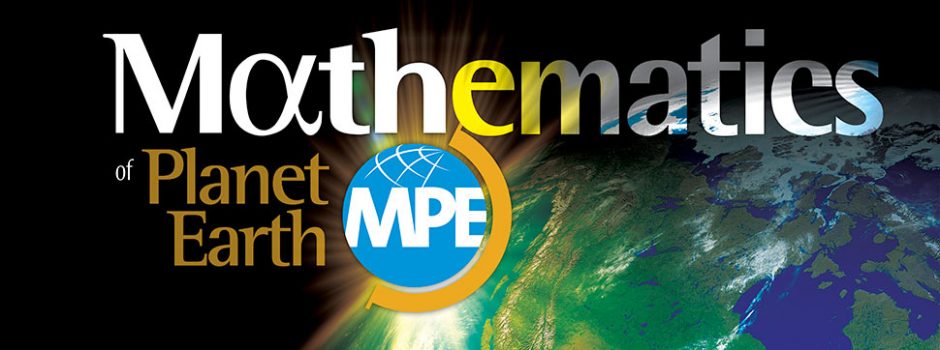Search
-
Recent Blogs
- What is MPE? April 22, 2020
- April 22, 2020 — 50 years of Earth Day April 17, 2020
- Major Website Constructors Reviews! | Create Your Own Website April 2, 2019
Professor Christopher K.R.T. Jones — Recipient of the 2020 MPE Prize

Professor Chris Jones is the Bill Guthridge Distinguished Professor in Mathematics at the University of North Carolina at Chapel Hill and Director of the Mathematics and Climate Research Network (MCRN). The 2020 MPE Prize recognizes Professor Jones for his many significant contributions to climate science and the mathematics of planet Earth.Categories
MPE2013 Newsletter
Category Archives: Natural Disasters
Mathematics Can Improve Seismic Risk Protection
Mathematical and numerical modeling can be used to better understand the physics of earthquakes, improve the design of site-specific structures and facilities, and enhance seismic-risk maps. Continue reading
Posted in Geophysics, Natural Disasters
Leave a comment
Mathematics, Statistics, and Storm Surges
Last week Philadelphia was a suburb of New Jersey. At least it seemed that way, with all the local news media coverage of hurricane Sandy on the one-year anniversary of its landing on the Jersey shore, on October 29, 2012. Continue reading
MPE2013+ Workshop at ASU, January 7-10, 2014
A workshop “Mathematics of Planet Earth: Challenges and Opportunities” will be held at Arizona State University, January 7-10, 2014. The workshop aims to expose students and junior researchers to the challenges facing our planet, the role of the mathematical sciences in addressing those challenges, and the opportunities to get involved in the effort. Continue reading
Fire Season
“It’s fire season in the forests and wildlands of America.” So began an article by Barry Cipra (“Fighting Fire with Data’). I recalled this article after hearing about the tragic events in the forest fires in Arizona earlier this week, Continue reading
Posted in Data Visualization, Meteorology, Natural Disasters, Weather
Leave a comment
DIMACS/CCICADA Collaboration on REU and Other Sustainability Projects
The Center for Discrete Mathematics and Theoretical Computer Science (DIMACS) and the Command Control Interoperability Center for Advanced Data Analysis (CCICADA), both based at Rutgers University, have collaborated on some recent activities to enhance the summer experience for several undergraduate students participating in the DIMACS/CCICADA Research Experiences for Undergraduates (REU) program. DIMACS and CCICADA recently co-hosted a workshop on Science and Technology Innovations in Hurricane Sandy Research. Continue reading
Posted in Astrophysics, Atmosphere, Biodiversity, Biogeochemistry, Biology, Biosphere, Carbon Cycle, Climate, Climate Change, Climate Modeling, Climate System, Complex Systems, Computational Science, Conference, Conference Announcement, Conference Report, Cryosphere, Data, Data Assimilation, Data Visualization, Dimension Reduction, Disease Modeling, Dynamical Systems, Ecology, Economics, Energy, Epidemiology, Evolution, Extreme Events, Finance, General, Geophysics, Imaging, Inverse Problems, Machine Learning, Mathematics, Meteorology, Natural Disasters, Networks, Ocean, Optimization, Paleoclimate, Patterns, Political Systems, Probability, Public Event, Public Health, Renewable Energy, Resource Management, Risk Analysis, Social Systems, Statistics, Sustainability, Sustainable Development, Tipping Phenomena, Transportation, Uncertainty Quantification, Weather, Workshop Announcement, Workshop Report
Leave a comment
SAMSI Undergraduate Workshop — Predicting the 2013 Hurricane Season Using Real Data
During the week of May 13, 2013, thirty-four students from around the United States attended the Statistical and Mathematical Sciences Institute (SAMSI) Undergraduate Modeling Workshop. Continue reading
Posted in Natural Disasters, Statistics, Weather, Workshop Report
Leave a comment
Finding a Sensible Balance for Natural Hazard Mitigation with Mathematical Models
Uncertainty issues are paramount in the assessment of risks posed by natural hazards and in developing strategies to alleviate their consequences. In a paper published last month in the SIAM/ASA Journal on Uncertainty Quantification, Jerome and Seth Stein describe a model that estimates the balance between costs and benefits of mitigation following natural disasters, as well as rebuilding defenses in their aftermath. Continue reading
Why do earthquakes change the speed of rotation of the Earth?
MPE2013 gives us an opportunity to learn more about our planet. There are interesting features to be explored that require simple but deep principles of physics and that can become the basis of a discussion in the classroom. Continue reading
Posted in Geophysics, Natural Disasters
Leave a comment
Workshop on “Mathematics of climate change, related hazards and risks”
A 5-day workshop on “Mathematics of climate change, related hazards and risks” will be held at the Centro de Investigación en Matemáticas (CIMAT) in Guanajuato, Mexico, July 29-August 2, 2013. This workshop, organized as part of the global program Mathematics of Planet Earth 2013 (MPE2013), is a satellite workshop associated with the 2013 Mathematical Congress of the Americas (MCA). Continue reading
Our Changing Shoreline: Modeling the Effects of Storm Surges on Coastal Vegetation
The unprecedented storm surge from Hurricane Sandy was enough to shift coastal shorelines along New York and New Jersey. One barrier island, Fire Island – off the southern coast of Long Island, N.Y., for example, traveled as much as 85 … Continue reading
Posted in Ecology, Mathematics, Natural Disasters
Leave a comment




